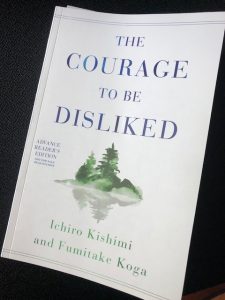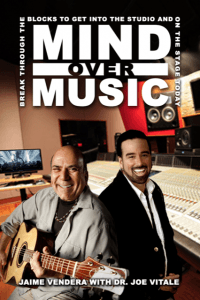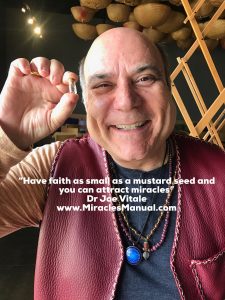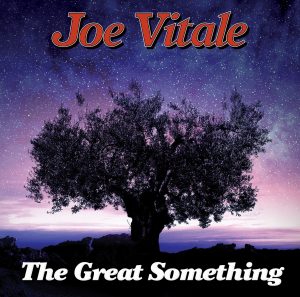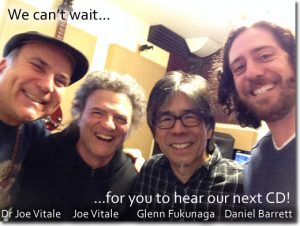Tag: empowerment
The Courage To Be Disliked
Last month I was lucky enough to be given an advanced prepublication review copy of The Courage to Be Disliked by Ichiro Kishimi and Fumitake Koga (Atria Books, May 2018 release).
I say “lucky” because the book changed my life.
I had never heard of it before. But the book is a runaway bestseller in Japan. It sold 3.5 million copies in Asia.
- A million copies sold of any book is miraculous.
- Over three million copies sold in Japan alone is staggering.
The book is a dialogue between a student and a philosopher.
The messages are potent.
Most of the material stems from the work of psychologist Alfred Adler. As much as I’ve read in psychology, I wasn’t familiar with Adler.
I am now.
Adler (1870-1937) was an Austrain physician, psychotherapist, and the founder of Adlerian psychology, sometimes called Individual Psychology.
Around 1907 Adler and Freud, along with Rudolf Reitler and Wilhelm Stekel, began meeting weekly in a type of early mastermind. Their “Wednesday Night Meetings” eventually grew into the birth of the psychoanalytic movement.
Freud and Adler did not agree and went separate ways. I’m currently collecting and reading Adler’s works, such as Understanding Human Nature (1927) and The Science of Living (1929).
While I am digging into the original words of Adler, I find The Courage To Be Disliked an easier approach to understanding him.
Here’s why…
The Courage to Be Disliked is a refreshing stir for self courage.
Rather than giving away your power to circumstances, you use your power for choice.
The book explains etiology, which is the idea of cause and effect, versus teleology, which is the idea of meaning and choice.
“We are not determined by our experiences, but are self-determined by the meaning we give to them…” – Alfred Adler
In other words, many schools of thought (including Freud’s) say you are the product of your past and/or your environment.
That is cause and effect thinking, or etiology.
But Adler’s approach is to say you can create your life from new meaning and choice, which is teleology.
Obviously, the latter is more empowering and freeing.
The latter doesn’t need anything outside of you to change for you to change.
You can change with a decision.
The Adler way is not one of victimhood but of empowerment.
For example, rather than saying you are the way you are due to the circumstances of your childhood, or current circumstances, you instead choose to create how you want to be from goals selected out of this moment.
- The past has no hold over you.
- Environment has no hold over you.
- Others have no hold over you.
At first glance, the concepts in The Courage to Be Disliked could seem daunting and unrealistic.
But as I kept reading the book, and following the concepts being explained, I realized that this book is a manual for awakening.
There are too many concepts to repeat here, but one crucial one is this:
“All problems are interpersonal relationship problems.”
Let that sink in.
“All problems are interpersonal relationship problems.”
The idea (simplified) is that you may sometimes try to please others, which is giving away your power to others.
You can’t easily be happy if you are waiting on another’s approval.
When you choose yourself, you are free.
You may be disliked; but you are free.
But here’s an even deeper insight…
An advanced insight is this: you have an interpersonal problem with someone in order to justify something you don’t want to do.
In short, you created the need for an excuse and then created the interpersonal problem to rationalize the excuse.
The problem or person didn’t come first; your need for a way out did.
This is similar to my own observation:
“The meaning you give an event is the belief that attracted it.”
You don’t realize it, but it’s actually you and your meaning/beliefs creating your life.
This completely transforms the idea of problems with other people.
You created them!
The Courage To Be Disliked explains all of this, and more, in an easy to read style.
It’s simply a conversation.
But “the student” is asking what you would probably ask.
And “the philosopher” is responding as might Socrates, or Adler himself.
Along the way you get “aha” moments of insights.
For example, learning to separate tasks is important.
That means learning to understand what is under your task to do, and what is for others to do.
- Wanting someone to like you isn’t your task. It’s theirs.
- Wanting a child to clean his or her room isn’t your task. It’s the child’s.
- Wanting to be recognized for success isn’t your task. It’s the public’s.
Knowing this “task separation” gives you freedom.
“We cannot think, feel, will, or act without the perception of some goal.” – Alfred Adler
I’ve often referred to people trying to give me their task as them trying to give me their monkey.
They don’t want to care for “the monkey” so they try to pass it off to me.
But I have enough monkeys.
Knowing that I don’t want another monkey, and that their task isn’t mine to do, makes it easier for me to have a boundary and maintain it for my own self-care.
As a result, I can be free.
Here’s a recent example:
Jaime Vendera is a vocal coach. A terrific one. He’s written Raise Your Voice and The Ultimate Breathing Workout. He’s helped lots of singers, including me.
He wrote to me one day saying he had an idea for a book I could write. He suggested it could be about mindset for musicians.
While I liked the idea, I sensed he was passing a monkey to me.
So I wrote back, saying it was his idea, or his task, so he should write it.
To my surprise, and his credit, he took the challenge.
He completely wrote the book, showed it to me, and I added some content, and a subtitle to it.
We are now coauthors of the book, Mind Over Music: Break Through the Blocks to Get Into the Studio and Onto the Stage. (It’ll be out next month.)
Instead of my taking on his task, I simply kept my boundary and supported him.
The result was a win-win for both of us.
Do you see how this works?
The Courage to Be Disliked contains far more wisdom, theory, and technique than I could possibly relay in this article.
But I don’t want you to settle for this post.
I want you to read the book.
Whether you do or not, of course, is your task, not mine.
Ao Akua,
PS – The Courage To Be Disliked will be in stores May 8, 2018. You can order it in print, for your Kindle reader, or on audio right now at Amazon: https://smile.amazon.com/Courage-Be-Disliked-Phenomenon-Happiness/dp/1501197274/
Self-Help Songs
How can “self-help songs,” well, help your self?
My six singer-songwriter albums all contain original tunes of “song therapy.”
They often contain positive messages of motivation, transformation, and inspiration.
It’s my way of helping you through challenges and tough times with songs of encouragement.
In many ways, my songs are “coaches” in lyrical form.
My newest album, The Great Something – now on iTunes, CDBaby, Amazon, and more – contains the most advanced and memorable self-help songs of my career so far. But don’t take my word for it. Note –
Stephen Oliver said (used with his permission) “I just received my copy of your new CD, “The Great Something”. As soon as I got into my home office (I’m a freelance writer), I put it on the stereo. I’m listening to it as I write. Now I’m in a quandary. I can’t decide whether it’s incredible or ‘merely’ fantastic. Either way, I love it. I’ve already added it to my night time playlist, along with all your other CDs.”
And Jimbo Berkey said (used with his permission) “After listening to your newest album, “The Great Something,” I am convinced that it is the most powerful and compelling message that anyone who hasn’t begun this journey could ever encounter.” (Jimbo went on to buy 20 more copies of the CD to give out to people.)
Let me explain how you can use self-help songs like the ones on The Great Something in your life:
“The Hook”
When you are facing a situation where someone or something is about to “set you off,” take a breath. The self-help song “The Hook” (on my One More Day album) contains the message “Don’t Take the Hook!” It’s a reminder that you don’t have to take the bait. In general, whenever you get upset, it’s when you went unconscious. Something or someone flipped your internal switch and you got mad or sad. The song “Don’t Take the Hook” is your reminder that you have choice; you don’t have to get engaged or outraged. You can always walk away. You can even walk away singing, “Don’t take the hook!”
“The Glad Game”
But if you do take the hook and find yourself upset, you can always play The Glad Game to recover. I wrote this self-help song because of the famous book, and many movie adaptations of it, called Pollyanna. “The Glad Game” (on The Great Something album) is your reminder that you can find the good in any situation or person. You may have to really look. But it’s always there. Always. This upbeat swing-rock-dance song will show you the way.
“Look for the Light”
One way to find the good, or play The Glad Game, is to “Look For the Light.” This self-help song, also on The Great Something album, is a reminder that there is light (or good, or glad, or positive) in any and every situation. This song was born when someone asked me how to handle political fighting and opinion conflicts that split people. I spontaneously said, “Look for the light.” There are always people doing good things, and good causes you can find and support. But you may need to pause and look for it.
“Empowerment”
You’ll find yet another way to use lyrics as affirmations in my self-help song “Empowerment” on my album The Healing Song. This instrumental cried out for my voice, so I allowed inspiration to guide me in speaking hypnotic commands of inner strength. Listening to this track alone can strengthen your mental core, so you can have, do, or be, whatever you imagine and work toward. I listen to this song every time it shuffles up on my playlist. It’s powerful.
“There’ll Be Days”
After my private songwriting lesson with rock legend Melissa Etheridge, all of my music became more focused. The self-help song “There’ll Be Days” (also on my latest album, The Great Something) is my favorite song for conveying wisdom in a traditional singer-songwriter folk format. It’s a reminder that some days will be tough, and some will be tender, but you can get through them all if you smile and remember this song. I know it doesn’t sound humble at all, but I think this song is pure genius. At least I can’t stop listening to it. It’s hauntingly beautiful.
“The Great Something”
When you need reminded that you aren’t alone, and that the dark night of the soul will pass, you might listen to “The Great Something” (the title track on The Great Something album). This self-help song was directly inspired by my lesson with Melissa Etheridge. She advised me to write in the first person. I took her advice to heart and wrote the most personal, raw, and revealing song of my life so far. I listened to it earlier today to remind myself that “The Great Something” – what others might call Divine, Universe, Nature, Gaia or something else – is with you always.
“Some Thoughts”
Everybody has thoughts, but not everybody knows they are not their thoughts. The self-help song “Some Thoughts,” on my One More Day album, is an upbeat tune reminding you that some thoughts serve you and some thoughts suck. But you can play the jukebox in your mind and just select a different song/thought at any time.
“You Gotta”
The self-help song “You Gotta” (on my album titled Sun Will Rise) is a pep-talk in song. With saxophone, guitar and an upbeat drum (by the drummer with the same name as me), this one is designed to urge you to get up, get moving, and move toward your dreams. “You gotta dream, dare, grow and go” is an affirmation and command. After all, any dream you want to attract requires movement from you, as life is a co-creation.
“Everybody’s Going thru Something”
The most popular music video I ever had created is the one made to breathe life into the self-help song, “Everybody’s Going thru Something” (on my very first album, Strut!). I wrote this song to remind us that we all have dreams and we all have pains. If we can be more understanding, we can bring more peace to the world. (See the music video at the end of this post.)
“Remember”
The smokey-bluesy-jazzie self-help song “Remember” (on the album Reflection) is a hypnotic-poetic ballad revealing the creativity technique I used to make numerous albums. The technique is called The Remembering Process and Daniel Barrett, my producer, and I wrote a book explaining it called, naturally enough, The Remembering Process. With baritone saxophone and a smooth groove, this spoken word song offers you another way to enjoy creativity. For some reason I want to say this song is really hip.
If this intrigues you, please see All Healing Music, the portal for almost all of my healing music (many recorded with Guitar Monk Mathew Dixon) and self-help songs (all recorded with my band of legends: Daniel Barrett, drummer Joe Vitale, Glenn Fukunaga).
Remember, what you listen to also programs you.
Choose wisely.
Ao Akua,
PS – Audio samples of my singer-songwriter albums are here: http://www.cdbaby.com/Artist/JoeVitale1
PPS – You may also be interested in a blog post I wrote last year about Motivational Songs at https://www.mrfire.com/music/motivational-songs/

